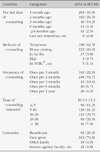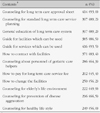Abstract
Purpose
The purpose of this study was to examine satisfaction with counseling in long-term care service, and to compare the scores of counseling satisfaction according to variables among beneficiaries of Korean long-term care services.
Methods
Questionnaires were completed by 445 beneficiaries of long-term care insurance to measure satisfaction with counseling. Research design was cross-sectional descriptive design. Data were analyzed using descriptive statistics, t-test and ANOVA for evaluating differences in satisfaction with counseling according to variables including economic status, the level of long-term care insurance approval, duration of long term care service, and conditions of counseling.
Figures and Tables
References
1. An YJ, Choi YS. Survey on needs for family counseling among married men and women living rural area: Focused on sociodemographic characteristics. J Fam Relat. 2009; 13(4):27–48.
2. Bang SH, Jang HJ. Activities of Daily Living of the elderly with a chronic disease and burden on family care-givers. J Korean Acad Nurs. 2007; 37(1):135–144.

3. Center for Medicare & Medicaid. State health insurance and assistance programs. 2010. Retrieved September 15, 2010. from http://www.cms.gov/Partnerships/10_SHIPS.asp.
4. Choi SW. Empowerment elderly counseling. J Welf Aged. 2003; 20(2):29–47.
5. Cho YH, Kim GS. Family caregivers' burden and needs for a professional help by the symptom level of the elderly with dementia. J Korean Gerontol Soc. 2010; 30(2):369–383.
6. Doty P. The cash and counseling demonstration: An experiment in consumer directed personal assistance services. Am Rehabil. 1998; 24(3):27–30.
7. Fries BE, Shugarman LS, Morris JN, Simon S, James MA. Screening system for Michigan's home and community-based long-term care programs. Gerontologist. 2002; 42(4):462–474.
8. Gallant MP, Connell CM. Predictors of decreased self-care among spouse caregivers of adults with dementing illness. J Aging Health. 1997; 9(3):373–395.
9. Hill A, Brettle A. The effectiveness of counselling with older people: Results of a systematic review. Couns Psychother Res. 2005; 5(4):265–272.

10. Hill A, Brettle A. Counseling older people: What can we learn from research evidence? J Soc Work Pract. 2006; 20(3):281–297.
11. Hwang JY. Health information counseling for elderly. J Hum Relatsh. 2007; 12(1):19–45.
12. Kim MD, Hong SC, Lee CI, Kim SY, Kang IO, Lee SY. Caregiver burden among caregivers of Koreans with dementia. Gerontology. 2009; 55:106–113.

13. Kim SD, Bin SO. User satisfaction survey for long-term care insurance for the elderly in some parts of the Kyeongbuk province: Focused on users of elderly care facilities. J Soc Sci. 2010; 36(2):43–60.
14. Kim SY, Kim JS, Youn HS. Predictors of depression and life satisfaction among family caregivers for demented elderly. J Korea Gerontol Soc. 2004; 24(2):111–128.
15. Lee ES. A study on parents' understanding and satisfaction of the counseling services from the child counseling agencies. Seoul: Duksung Women's University;2010. Unpublished master's thesis.
16. Lee HS. Counseling for older. Seoul: Hakjisa;2005.
17. Lee HS, Jung YM, Kim GU, Kim HS, Sim SJ, Lee SY, et al. Development of long-term care insurance counseling manual & counseling model. Seoul: National Health Insurance Corporation;2010.
18. Lee IJ. Factors affecting satisfaction of family caregivers in adult day care services. J Korea Gerontol Soc. 2002; 22(1):99–114.
19. National Health Insurance Corporation. Statistics of long term care facility. 2010. Retried December 19, 2010. from http://www.longtermcare.or.kr/portal/site/nydev/menuitem.
20. Park HJ. Study on the present condition of play therapy, levels of mother's understanding and counseling satisfaction about play therapy. Seoul: Sookmyung Women's University;2000. Unpublished master's thesis.
21. Statistics Korea. Statistics for estimated future population. 2010. Retrieved December 20, 2010. from http://kosis.kr/wnsearch/totalSearch.jsp.
22. Stiles WB. Measurement of the impact of psychotherapy sessions. J Consult Clin Psychol. 1980; 48:176–185.

23. Suh MH, Oh KS. A study of well-being in caregivers caring for chronically ill family members. J Nurs Acad Soc. 1993; 23(3):467–486.

24. Son GR, Wykle ML, Zauszniewski JA. Korean adult child caregivers of older adults with dementia. J Gerontol Nurs. 2003; 29(1):19–28.
25. Wyman JF, Croghan CF, Nachreiner NM, Gross CR, Monigold M. Effectiveness of education and individualized counseling in reducing environmental hazards in the homes of community-dwelling older woman. J Am Geriatr Soc. 2007; 55(10):1548–1556.
26. You KS. A study on the care burden of family caregivers for senile dementia. J Korea Community Health Nurs Acad Soc. 2001; 15(1):125–147.




 PDF
PDF ePub
ePub Citation
Citation Print
Print







 XML Download
XML Download